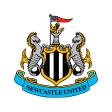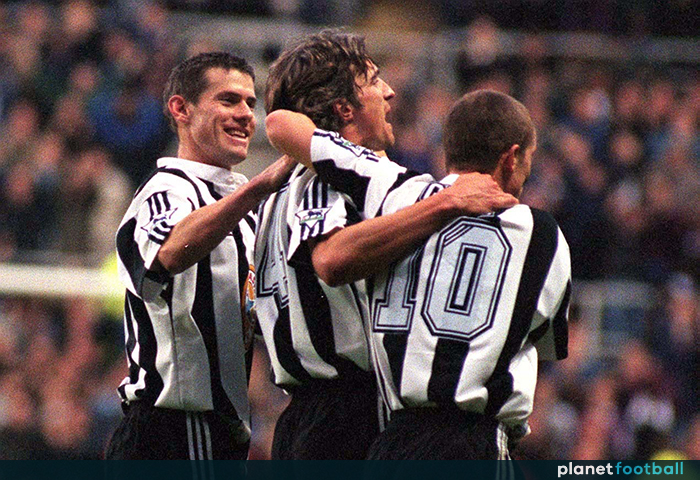A celebration of David Ginola and an incredible Newcastle United bargain
David Ginola’s performances for Newcastle United and Tottenham won him the hearts of a nation – and this incredible entertainer moved to the Premier League for just £2.5million.
Ginola made 195 appearances in the Premier League for four clubs, and though the only silverware he won was the League Cup with Spurs in 1999, he was a player who captured the hearts of many.
And for both Newcastle and the Lilywhites, he was an absolute bargain.
The problem
When Kevin Keegan took over at Newcastle in 1992 they were in the second tier of English football, having spent their entire post-war history bouncing between the first and second divisions.
Keegan implemented a stylish and exciting style and led the Magpies to the Divison One title at the first time of asking, a huge improvement from their 20th-place finish the season before.
That remarkable turnaround continued into the Premier League as they recorded the best-ever finish for a newly-promoted side in the Premier League, finishing third thanks largely to the exploits of 22-year-old hotshot Andy Cole, who scored 34 goals in his 40 league appearances.
The Magpies led the league throughout the autumn of the 1994-95 season, but selling Cole to Manchester United without signing a proper replacement had a disastrous effect and saw Newcastle end up finishing sixth.
The other problem position for Keegan was left wing. Scott Sellars, Lee Clark, Steve Watson, Paul Kitson, Paul Bracewell and Keith Gillespie all made a stab at filling that role, but Keegan was seemingly never quite satisfied with any of his options.
The market
Perhaps understandably after selling Cole for an English record fee of £6million plus Keith Gillespie in January 1995, no English club spent more than Newcastle ahead of the 1995-96 season. Only the two Merseyside clubs had a higher net transfer spend.
Their marquee signing was the England striker Les Ferdinand from QPR for the same £6million they had netted from Cole’s sale – leaving only that left-wing berth open for obvious improvement.
With the Bosman ruling not taking effect until December 1995, moves for players from abroad were still relatively uncommon for all but a handful of mid-table clubs who were willing to experiment: the likes of Middlesbrough, Bolton, Everton, Tottenham and Sheffield Wednesday.
Attitudes were changing, however, due in no small part to the huge success of Jurgen Klinsmann at Spurs.
The German had signed from Marseille for just £2million and scored 21 goals in 41 Premier League games, earning the Football Writers’ Awards Player of the Year for the season and ending 1995 as Ballon d’Or runner-up.
Klinsmann’s example showed that hugely talented players could be found at discount rates, and the still very new riches of Premier League football gave English sides an edge over their Spanish, Italian and French rivals.
What they could have had
For the cost of one David Ginola in summer 1995, (£2.5m), Newcastle could have signed:
– Two-thirds of Gary Speed (Leeds to Everton, £3.5m)
– David Platt’s right side – the England midfielder, not the Coronation Street troublemaker (Sampdoria to Arsenal, £4.75m)
– Half of Nick Barmby, which really isn’t very much as he’s tiny enough already (Tottenham to Middlesbrough, £5.25m)
– Dennis Bergkamp from the knees down, shinpads not included (Inter to Arsenal, £7.5m)
The signing
Ginola was French Player of the Year in 1993-94, but midway through that same season national team manager Gerard Houllier had publicly blamed Ginola for France’s failure to qualify for the 1994 World Cup.
France needed a draw against Bulgaria in their final qualification game, and with the scores level and the ball in the corner in injury time, they looked set to squeak through to the summer tournament in the USA.
Ginola showed a lack of game management and decided to cross, however, and Bulgaria promptly broke up the other end and scored to qualify at France’s expense.
Despite his team-mates expressing no ill-will towards Ginola, his manager’s condemnation was enough to make him into the nation’s whipping boy.
As a result, Ginola had good reason to want to look abroad for his domestic football. He had long been courted in Spain, having starred for Paris Saint-Germain in European clashes with the Spanish giants.
Ginola scored in both legs of PSG’s UEFA Cup elimination of Real Madrid in 1993 (scoring one of the greatest goals in European football history in the process), starred in a second Madrid elimination in the following year’s Cup Winners’ Cup, and drew the attention of his idol Johan Cruyff by helping PSG to knock out his reigning champions Barcelona in the 1994-95 Champions League quarter-finals.
Yet despite competition from Barcelona, Bayern Munich and Juventus, it was Newcastle who came away with Ginola’s signature in a £2.5million deal.
The legacy
For a still relatively-recently promoted side to beat European giants to one of the most widely-admired players in Europe was as outrageous then as it would be now, regardless of how well Newcastle had performed since their promotion.
Unsurprisingly, then, Ginola was a smash hit on Tyneside even before he set foot on the turf at St James’s Park – and he only heightened that fever pitch with some sensational performances as Newcastle won their first four games of the season, earning Ginola the Premier League Player of the Month award for August 1995.
Unfortunately for Newcastle and Keegan, Ginola’s form over the season mirrored that of the club as a whole: a scintillating first half followed by a disappointing end, resulting in Newcastle blowing their 12-point lead in their last 15 games of the season.
Ginola is emblematic of Newcastle in their failed title challenge of 1995-96. Rather like his manager, he often paid no attention to defending whatsoever.
Three games from the end of the season, left-back John Beresford complained to Keegan that he was effectively marking two Aston Villa players due to Ginola’s refusal to track back with four games remaining.
It turned into a public argument that ended with Beresford telling Keegan to ‘fuck off’ and unsurprisingly being substituted as a result. He was dropped for the last two games.
The season was effectively an extended version of that France v Bulgaria game. The very approach that made Newcastle into title challengers also ultimately cost them the league title.
Still, it was next to impossible not to fall in love with Ginola, a beautiful footballer who was capable of such magic, regardless of his lack of off-the-ball work ethic.
• • • •
READ: A tribute to Kevin Keegan and the Newcastle United Entertainers
• • • •
Unfortunately, Keegan’s sudden departure from Newcastle and replacement by four-time title-winning manager Kenny Dalglish effectively spelt the end for him at St James’.
As with Houllier before him and George Graham later on at Spurs, Ginola felt stifled by Dalglish’s demands.
He had joined Newcastle precisely because of Keegan’s laissez-faire attitude towards flair players, so Dalglish’s approach did not sit well, and he departed for Tottenham for the same £2.5million Newcastle had paid for him in the first place.
In spite of Graham’s public and vocal disbelief at Ginola’s single-minded style of play, El Magnifico actually enjoyed his best-ever season in 1998-99, winning both the PFA Players’ Player of the Year and the FWA Footballer of the Year at the age of 32.
He may not have been a team player, and it’s easy to see why he so infuriated such a diverse series of managers, but we all have a special place in our hearts for the mercurial luxury player.
There is perhaps nobody else in Premier League history who has worn that tag more comfortably than David Ginola.
READ NEXT: Newcastle’s Forgotten Entertainers: I lost 70% of the vision in my right eye
TRY A QUIZ: Can you name Newcastle’s top 30 goalscorers of the Premier League era?


























